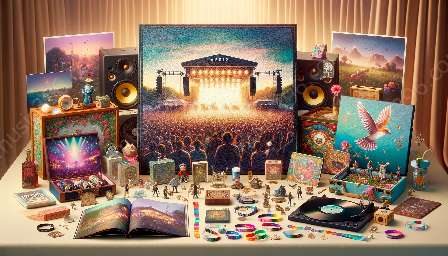The music industry has continued to transform rapidly in recent years, and this evolution is evident not only in the music itself, but also in the merchandise and memorabilia associated with it. Music merchandise and memorabilia are invaluable touchstones that reflect the changing landscape of the music industry, serving as a mirror to the shifting trends and consumer behaviors. By delving into the world of music merchandise and memorabilia, we can gain insights into the industry's evolution and the impact it has had on the fan experience, marketing strategies, and the overall commercial landscape.
Music Merchandise as Memorabilia: A Bridge Between Music and Fan Culture
Music merchandise, including items such as T-shirts, posters, vinyl records, and other collectibles, is deeply intertwined with the history and culture of the music industry. As the industry has evolved, so too has the nature of music merchandise. These items not only serve as extensions of an artist's brand but also as tangible connections to moments in music history. From vintage concert T-shirts to limited-edition vinyl releases, music merchandise has become a form of memorabilia that encapsulates the essence of different eras in music.
Historical Significance and Emotional Value
Music merchandise and memorabilia hold historical and emotional significance for music fans. From concert tickets and autographed guitars to rare posters and artwork, these items serve as tangible mementos of musical experiences and cultural movements. They provide a unique window into the evolution of popular music and the impact it has had on society. Moreover, music merchandise and memorabilia often hold immense emotional value for fans, connecting them to their favorite artists and serving as reminders of personal memories and experiences.
Marketing and Commercial Implications
As the music industry has shifted from physical album sales to digital streaming, music merchandise and memorabilia have taken on new significance in the commercial landscape. Artists and record labels have recognized the potential of these items as revenue streams and tools for engaging with fans. The rise of e-commerce platforms and social media has also transformed the way music merchandise is marketed and sold, allowing for direct-to-consumer interactions and personalized experiences. Furthermore, the use of limited-edition merchandise and exclusive releases has become a strategic marketing tool, creating hype and demand around an artist's brand and music.
Music Art and Memorabilia: An Intersection of Creativity and Commerce
Music art and memorabilia represent the intersection of creativity and commerce within the music industry. Artwork associated with albums, concert posters, and promotional materials often becomes cherished memorabilia that holds intrinsic value for fans. Additionally, the creativity and design elements of music merchandise have become an art form in their own right, reflecting trends in graphic design, fashion, and pop culture. The symbiotic relationship between music art and memorabilia further demonstrates the industry's dynamic evolution and the multifaceted ways in which music has permeated popular culture.
Collecting and Preserving Music Memorabilia
As music merchandise and memorabilia continue to evolve, collectors and archivists play a crucial role in preserving these artifacts for future generations. Museums, galleries, and dedicated collectors actively seek out and preserve rare and significant music memorabilia, recognizing their cultural and historical importance. By curating and showcasing these items, they contribute to a deeper understanding of the music industry's evolution and its impact on society.
Conclusion
Music merchandise and memorabilia provide a fascinating lens through which to examine the changing landscape of the music industry. These items not only reflect the industry's commercial and marketing strategies but also embody the emotional connections between artists and their fans. As the music industry continues to evolve, the role of music merchandise and memorabilia will undoubtedly remain integral in preserving the legacy of artists and documenting the cultural impact of music.























